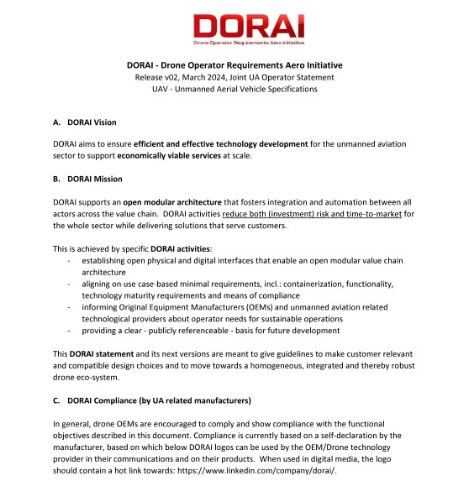The partners of the Drone Operator Requirements Aero Initiative (DORAI) have formally adopted the second DORAI statement v02. The statement targets a harmonised and modular unmanned aviation industry. It helps drone manufacturers to:
(1) focus development efforts, to reduce cost and risk,
(2) get products to market faster, to build market and sector reputation,
(3) build a viable market through scale & automation to improve profitability.
This second version v02 of DORAI drone requirements is in line and deepens the first DORAI statement v01. It results from a second consecutive half year intensive collaboration and alignment amongst partner drone operators on a pan-European level. DORAI member home countries are: France, Italy, The Netherlands, Switzerland, Belgium and Greece. The statement includes real life experience based on:
(1) in-depth use case analysis with direct customer involvement
(2) real flight time with a variety of drones & working relationships with multiple drone manufacturers
(3) intensive work with aviation regulatory, standardisation and R&D project bodies.
The DORAI members require their OEM technology suppliers (Original Equipment Manufacturer) to follow DORAI minimum requirements in their drone platform developments with specific timing. Requirements cover key aspects:
(1) Drone performance and compliance maturity
(2) Hardware (incl. drone specifications, payload sizes & handling automation)
(3) Software (incl. interfaces towards operator BVLOS Ground Control Center to enable U-space operator responsibilities).
Drone related actors are invited to provide input for future DORAI statements to be updated half yearly. DORAI is also open to operators who wish to collaborate on these industry requirements, as long as they subscribe to a modular drone industry setup and do themselves not manufacture drones.
This effort runs in parallel to European SAFIR-Ready SESAR3 fast track project and SAFIR-Med projects where pan European (including the UK and Switzerland) partners and advisory members adhere to DORAI requirements, and ensure alignment with EU U-space legislation. These legislative R&D projects are executed for SESAR3 Joint Undertaking in collaboration with EUROCONTROL, EUROCAE, EASA, DG Move and European Defense Agency (EDA).
DORAI’s objective is to ensure the development of efficient, effective, and economically viable drone services, by establishing clear, publicly referenceable standards to shape the future of drone design, promoting scalability, modularity, and sustainability.




